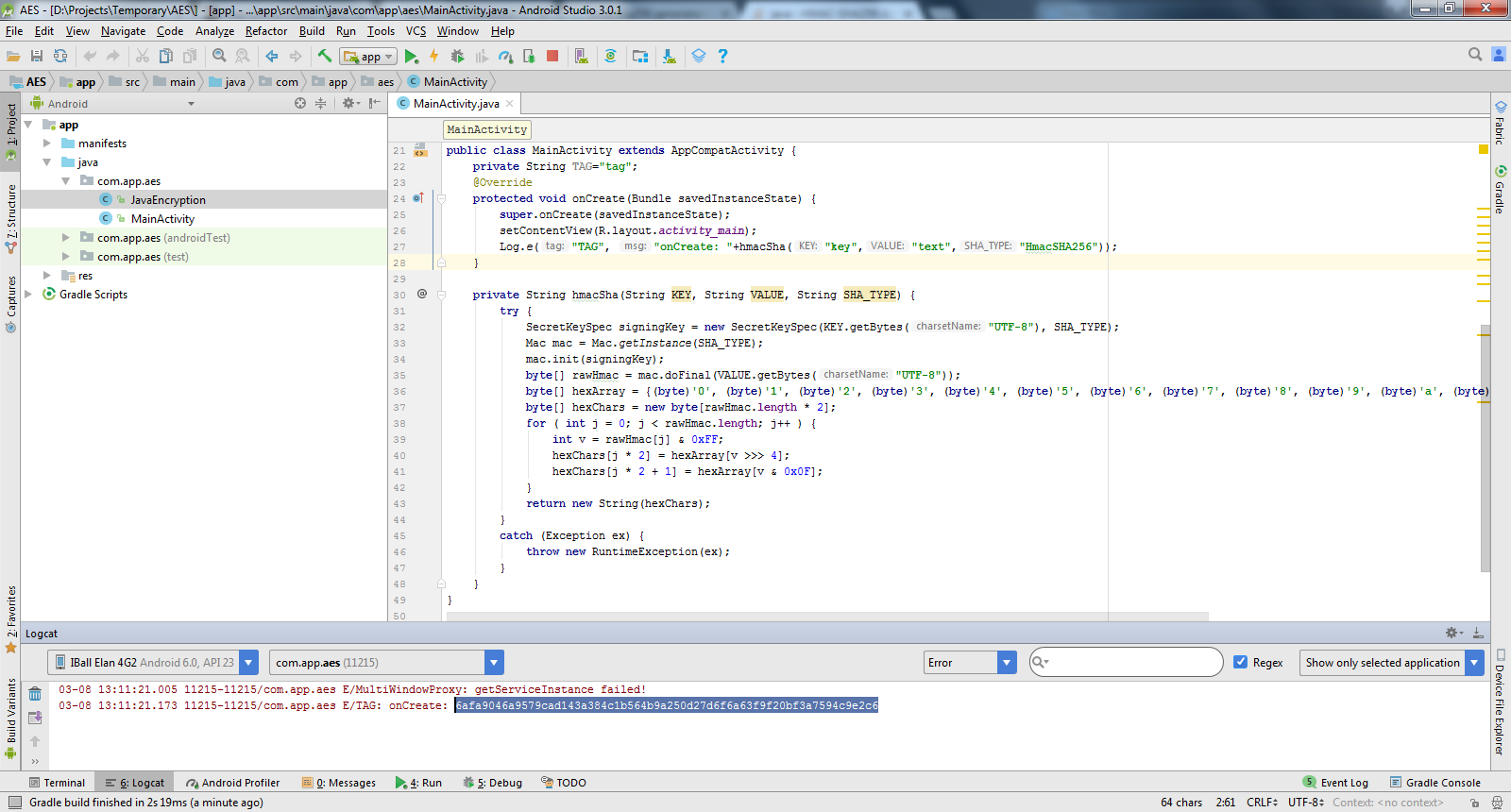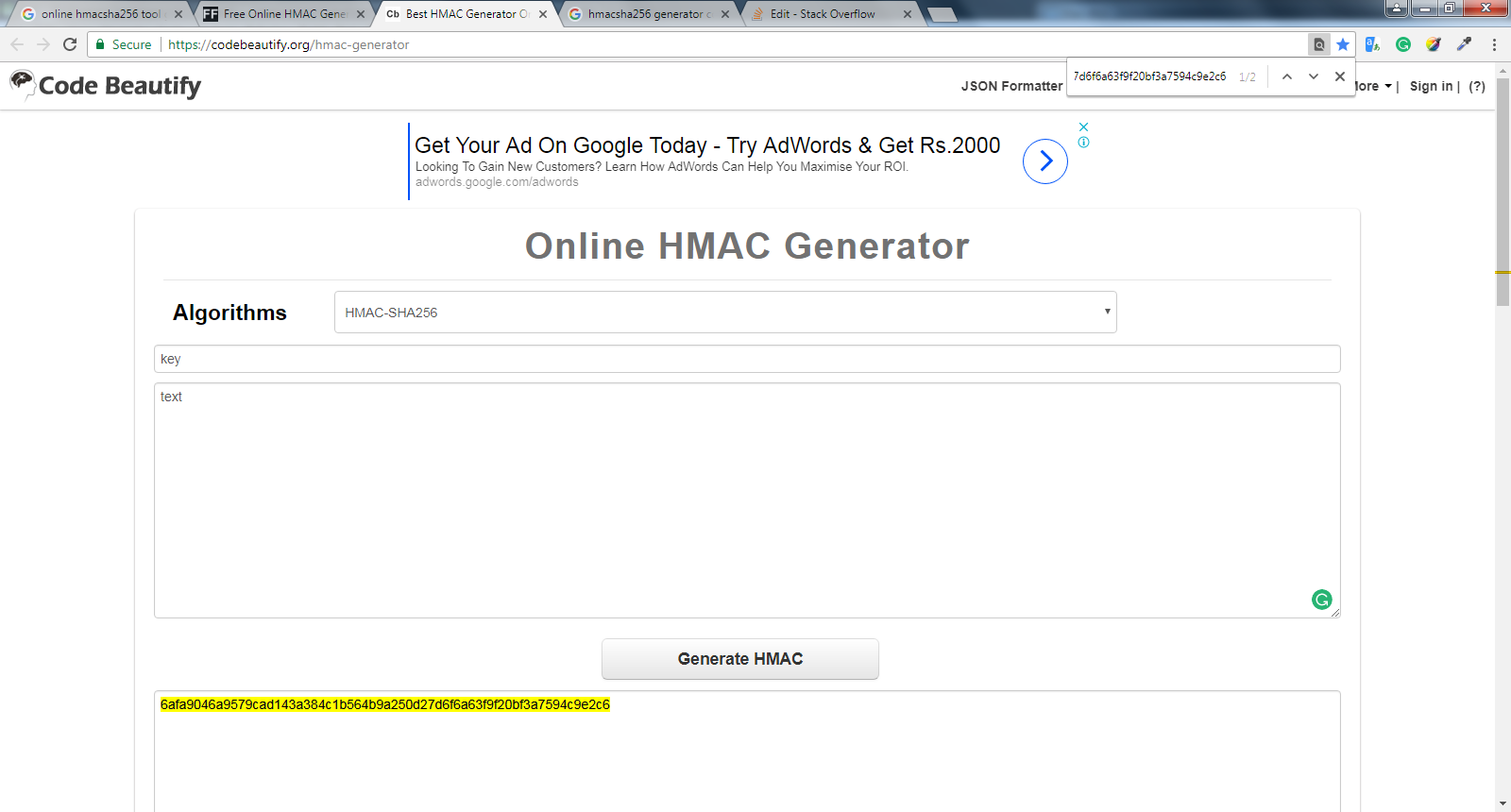Algorithme HMAC-SHA256 pour le calcul de la signature
J'essaie de créer une signature en utilisant L'algorithme HMAC-SHA256 et c'est mon code. Je Nous utilise l'encodage ASCII.
final Charset asciiCs = Charset.forName("US-ASCII");
final Mac sha256_HMAC = Mac.getInstance("HmacSHA256");
final SecretKeySpec secret_key = new javax.crypto.spec.SecretKeySpec(asciiCs.encode("key").array(), "HmacSHA256");
final byte[] mac_data = sha256_HMAC.doFinal(asciiCs.encode("The quick brown fox jumps over the lazy dog").array());
String result = "";
for (final byte element : mac_data)
{
result += Integer.toString((element & 0xff) + 0x100, 16).substring(1);
}
System.out.println("Result:[" + result + "]");
Le résultat que je reçois du code ci-dessus est:
f7bc83f430538424b13298e6aa6fb143ef4d59a14946175997479dbc2d1a3cd8
Ceci est identique à celui de Montré dans le wiki
HMAC_SHA256("key", "The quick brown fox jumps over the lazy dog") = 0x f7bc83f430538424b13298e6aa6fb143ef4d59a14946175997479dbc2d1a3cd8
sauf pour le 0x.
Je cherche des idées / commentaires si je fais tout correctement ou peut-être que je peux améliorer mon code.
9 réponses
Le 0x indique simplement que les caractères suivants représentent une chaîne hexadécimale.
0x1A == 1Ah == 26 == 1A
Donc, le 0x est juste pour clarifier dans quel format la sortie est, pas besoin de s'inquiéter à ce sujet.
, Voici ma solution:
public static String encode(String key, String data) throws Exception {
Mac sha256_HMAC = Mac.getInstance("HmacSHA256");
SecretKeySpec secret_key = new SecretKeySpec(key.getBytes("UTF-8"), "HmacSHA256");
sha256_HMAC.init(secret_key);
return Hex.encodeHexString(sha256_HMAC.doFinal(data.getBytes("UTF-8")));
}
public static void main(String [] args) throws Exception {
System.out.println(encode("key", "The quick brown fox jumps over the lazy dog"));
}
Ou vous pouvez renvoyer le hachage codé en Base64:
Base64.encodeBase64String(sha256_HMAC.doFinal(data.getBytes("UTF-8")));
La sortie en hex est comme prévu:
f7bc83f430538424b13298e6aa6fb143ef4d59a14946175997479dbc2d1a3cd8
La réponse que vous avez là est correcte. Une chose mineure dans le code ci-dessus, vous devez init(key) avant de pouvoir appeler doFinal ()
final Charset charSet = Charset.forName("US-ASCII");
final Mac sha256_HMAC = Mac.getInstance("HmacSHA256");
final SecretKeySpec secret_key = new javax.crypto.spec.SecretKeySpec(charSet.encode("key").array(), "HmacSHA256");
try {
sha256_HMAC.init(secret_key);
} catch (InvalidKeyException e) {
// TODO Auto-generated catch block
e.printStackTrace();
}
...
Si vous utilisez Goyave, sa dernière version vous permet maintenant d'utiliser
Hashing.hmacSha256()
Cela fonctionne bien pour moi
J'ai ajouter une dépendance
compile 'commons-codec:commons-codec:1.9'
Ref: http://mvnrepository.com/artifact/commons-codec/commons-codec/1.9
Ma fonction
public String encode(String key, String data) {
try {
Mac sha256_HMAC = Mac.getInstance("HmacSHA256");
SecretKeySpec secret_key = new SecretKeySpec(key.getBytes("UTF-8"), "HmacSHA256");
sha256_HMAC.init(secret_key);
return new String(Hex.encodeHex(sha256_HMAC.doFinal(data.getBytes("UTF-8"))));
} catch (NoSuchAlgorithmException e) {
e.printStackTrace();
} catch (InvalidKeyException e) {
e.printStackTrace();
} catch (UnsupportedEncodingException e) {
e.printStackTrace();
}
return null;
}
, Voici ma solution:
public String HMAC_SHA256(String secret, String message)
{
String hash="";
try{
Mac sha256_HMAC = Mac.getInstance("HmacSHA256");
SecretKeySpec secret_key = new SecretKeySpec(secret.getBytes(), "HmacSHA256");
sha256_HMAC.init(secret_key);
hash = Base64.encodeToString(sha256_HMAC.doFinal(message.getBytes()), Base64.DEFAULT);
}catch (Exception e)
{
}
return hash.trim();
}
Si vous avez trouvé une solution pour calculer HMAC-SHA256 ici, mais vous obtenez une exception comme celle-ci:
Java.lang.NoSuchMethodError: pas de méthode statique encodeHexString ([B)ljava / lang / String; dans la classe Lorg/apache/commons/codec/binaire/Hexadécimal; ou de ses super-classes (déclaration de 'org.Apache.commun.codec.binaire.Hex ' apparaît dans / système / cadre / org.Apache.http.héritage.démarrage.jar)
Ensuite, utilisez:
public static String encode(String key, String data) {
try {
Mac hmac = Mac.getInstance("HmacSHA256");
SecretKeySpec secret_key = new SecretKeySpec(key.getBytes("UTF-8"), "HmacSHA256");
hmac.init(secret_key);
return new String(Hex.encodeHex(hmac.doFinal(data.getBytes("UTF-8"))));
} catch (Exception e) {
throw new RuntimeException(e);
}
}
Code Java simple pour générer des signatures codées(HMAC-x). (J'ai essayé D'utiliser Java-8 et Eclipse)
import java.io.UnsupportedEncodingException;
import java.security.InvalidKeyException;
import java.security.NoSuchAlgorithmException;
import javax.crypto.Mac;
import javax.crypto.spec.SecretKeySpec;
import com.sun.org.apache.xml.internal.security.utils.Base64;
/**
* Encryption class to show how to generate encoded(HMAC-x) signatures.
*
*/
public class Encryption {
public static void main(String args[]) {
String message = "This is my message.";
String key = "your_key";
String algorithm = "HmacMD5"; // OPTIONS= HmacSHA512, HmacSHA256, HmacSHA1, HmacMD5
try {
// 1. Get an algorithm instance.
Mac sha256_hmac = Mac.getInstance(algorithm);
// 2. Create secret key.
SecretKeySpec secret_key = new SecretKeySpec(key.getBytes("UTF-8"), algorithm);
// 3. Assign secret key algorithm.
sha256_hmac.init(secret_key);
// 4. Generate Base64 encoded cipher string.
String hash = Base64.encode(sha256_hmac.doFinal(message.getBytes("UTF-8")));
// You can use any other encoding format to get hash text in that encoding.
System.out.println(hash);
/**
* Here are the outputs for given algorithms:-
*
* HmacMD5 = hpytHW6XebJ/hNyJeX/A2w==
* HmacSHA1 = CZbtauhnzKs+UkBmdC1ssoEqdOw=
* HmacSHA256 =gCZJBUrp45o+Z5REzMwyJrdbRj8Rvfoy33ULZ1bySXM=
* HmacSHA512 = OAqi5yEbt2lkwDuFlO6/4UU6XmU2JEDuZn6+1pY4xLAq/JJGSNfSy1if499coG1K2Nqz/yyAMKPIx9C91uLj+w==
*/
} catch (NoSuchAlgorithmException e) {
e.printStackTrace();
} catch (UnsupportedEncodingException e) {
e.printStackTrace();
} catch (InvalidKeyException e) {
e.printStackTrace();
}
}
}
REMARQUE: Vous pouvez utiliser n'importe quel autre cryptage au lieu de
Base64(par exemple:ASCII). Vous pouvez également essayer de générerHmacMD5,HmacSHA1,HmacSHA256,HmacSHA512les signatures.
Essayez ceci
Désolé d'être en retard, j'ai essayé toutes les réponses ci-dessus mais aucune d'entre elles ne me donne une valeur correcte, après avoir fait beaucoup de R&D, j'ai trouvé un moyen simple qui me donne une valeur exacte.
-
Déclarez cette méthode dans votre classe
private String hmacSha(String KEY, String VALUE, String SHA_TYPE) { try { SecretKeySpec signingKey = new SecretKeySpec(KEY.getBytes("UTF-8"), SHA_TYPE); Mac mac = Mac.getInstance(SHA_TYPE); mac.init(signingKey); byte[] rawHmac = mac.doFinal(VALUE.getBytes("UTF-8")); byte[] hexArray = {(byte)'0', (byte)'1', (byte)'2', (byte)'3', (byte)'4', (byte)'5', (byte)'6', (byte)'7', (byte)'8', (byte)'9', (byte)'a', (byte)'b', (byte)'c', (byte)'d', (byte)'e', (byte)'f'}; byte[] hexChars = new byte[rawHmac.length * 2]; for ( int j = 0; j < rawHmac.length; j++ ) { int v = rawHmac[j] & 0xFF; hexChars[j * 2] = hexArray[v >>> 4]; hexChars[j * 2 + 1] = hexArray[v & 0x0F]; } return new String(hexChars); } catch (Exception ex) { throw new RuntimeException(ex); }}
-
Utilisez ceci comme
Log.e("TAG", "onCreate: "+hmacSha("key","text","HmacSHA256"));
Vérification
1.Sortie studio Android
 2. Sortie du générateur HMAC en ligne (visitez ici pour en ligne Genrator)
2. Sortie du générateur HMAC en ligne (visitez ici pour en ligne Genrator)
